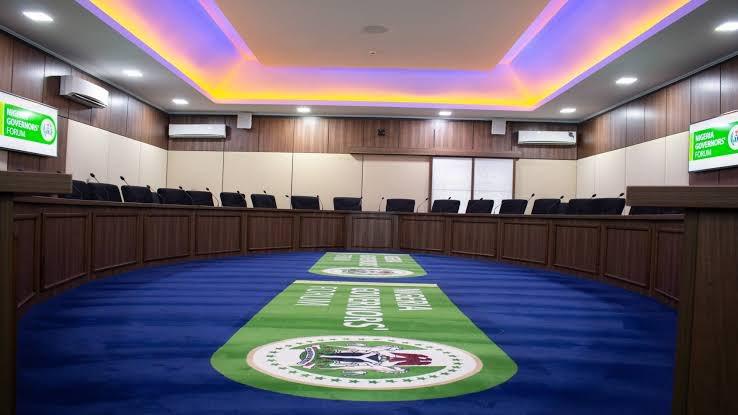The FG allocated N438 billion to the 36 states and the Federal Capital Territory (FCT) for the Nigeria Community Action For Resilience and Economic Stimulus (NG-Cares) Program:
Zamfara: 49,182,347,834.58
Nasarawa: 27,204,679,444.17
Plateau: 26,312,588,262.79
Gombe: 25,305,166,261.04
Kebbi: 21,589,480,398.09
Cross River: 20,670,241,709.19
Rivers: 19,517,766,804.45
Niger: 17,769,395.563.89
Adamawa: 17,535,952,985.60
Katsina: 15,455,420,486.35
Imo: 15,408,252,449-34
Sokoto: 14,177,508,862.60
Ondo: 13,925,262,355.18
Delta: 13,268,320,155.81
Abia: 12,175,577,893.70
Bayelsa: 10,830,587,695.70
Yobe: 10,172,244.387.67
Kwara: 9,915,101,215.91
Osun: 9,562,512,549.27
Bauchi: 7,304,665,994.92
Kogi: 6,903,713,160.77
FCT: 6,773,326,717.84
Ebonyi: 6,255,864,530.97
Enugu: 6,191,959,222.93
Kano: 6,154,448,839.35
Oyo: 5,966,675,258.19
Borno: 5,898,270,783.50
Jigawa: 5,770,132,061.00
Lagos: 5,569,060,730.14
Taraba: 5,508,762,972.80
Ekiti: 5,507,202,258.33
Edo: 5,122,103,650.09
Benue: 4,908,421,973.10
Akwa Ibom: 2,430,830,532.46
Ogun: 2,125,069,028.52
The Nigeria COVID-19 Action Recovery and EconomicStimulus (NG CARES)Programme now renamed Nigeria Community Action for Resilience and Economic Stimulus (NG- CARES) is a World Bank-supported intervention with a credit portfolio of 750 million US Dollars. The Programme Development Objective is "To expand access to livelihood support and food security services and grants for poor and vulnerable households and firms”
Zamfara: 49,182,347,834.58
Nasarawa: 27,204,679,444.17
Plateau: 26,312,588,262.79
Gombe: 25,305,166,261.04
Kebbi: 21,589,480,398.09
Cross River: 20,670,241,709.19
Rivers: 19,517,766,804.45
Niger: 17,769,395.563.89
Adamawa: 17,535,952,985.60
Katsina: 15,455,420,486.35
Imo: 15,408,252,449-34
Sokoto: 14,177,508,862.60
Ondo: 13,925,262,355.18
Delta: 13,268,320,155.81
Abia: 12,175,577,893.70
Bayelsa: 10,830,587,695.70
Yobe: 10,172,244.387.67
Kwara: 9,915,101,215.91
Osun: 9,562,512,549.27
Bauchi: 7,304,665,994.92
Kogi: 6,903,713,160.77
FCT: 6,773,326,717.84
Ebonyi: 6,255,864,530.97
Enugu: 6,191,959,222.93
Kano: 6,154,448,839.35
Oyo: 5,966,675,258.19
Borno: 5,898,270,783.50
Jigawa: 5,770,132,061.00
Lagos: 5,569,060,730.14
Taraba: 5,508,762,972.80
Ekiti: 5,507,202,258.33
Edo: 5,122,103,650.09
Benue: 4,908,421,973.10
Akwa Ibom: 2,430,830,532.46
Ogun: 2,125,069,028.52
The Nigeria COVID-19 Action Recovery and EconomicStimulus (NG CARES)Programme now renamed Nigeria Community Action for Resilience and Economic Stimulus (NG- CARES) is a World Bank-supported intervention with a credit portfolio of 750 million US Dollars. The Programme Development Objective is "To expand access to livelihood support and food security services and grants for poor and vulnerable households and firms”
The FG allocated N438 billion to the 36 states and the Federal Capital Territory (FCT) for the Nigeria Community Action For Resilience and Economic Stimulus (NG-Cares) Program:
Zamfara: 49,182,347,834.58
Nasarawa: 27,204,679,444.17
Plateau: 26,312,588,262.79
Gombe: 25,305,166,261.04
Kebbi: 21,589,480,398.09
Cross River: 20,670,241,709.19
Rivers: 19,517,766,804.45
Niger: 17,769,395.563.89
Adamawa: 17,535,952,985.60
Katsina: 15,455,420,486.35
Imo: 15,408,252,449-34
Sokoto: 14,177,508,862.60
Ondo: 13,925,262,355.18
Delta: 13,268,320,155.81
Abia: 12,175,577,893.70
Bayelsa: 10,830,587,695.70
Yobe: 10,172,244.387.67
Kwara: 9,915,101,215.91
Osun: 9,562,512,549.27
Bauchi: 7,304,665,994.92
Kogi: 6,903,713,160.77
FCT: 6,773,326,717.84
Ebonyi: 6,255,864,530.97
Enugu: 6,191,959,222.93
Kano: 6,154,448,839.35
Oyo: 5,966,675,258.19
Borno: 5,898,270,783.50
Jigawa: 5,770,132,061.00
Lagos: 5,569,060,730.14
Taraba: 5,508,762,972.80
Ekiti: 5,507,202,258.33
Edo: 5,122,103,650.09
Benue: 4,908,421,973.10
Akwa Ibom: 2,430,830,532.46
Ogun: 2,125,069,028.52
The Nigeria COVID-19 Action Recovery and EconomicStimulus (NG CARES)Programme now renamed Nigeria Community Action for Resilience and Economic Stimulus (NG- CARES) is a World Bank-supported intervention with a credit portfolio of 750 million US Dollars. The Programme Development Objective is "To expand access to livelihood support and food security services and grants for poor and vulnerable households and firms”
0 Comments
0 Shares
435 Views
0 Reviews







